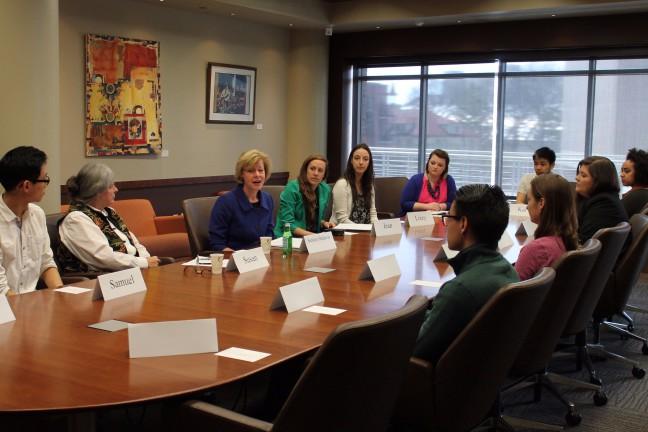U.S. Sen. Tammy Baldwin, D-Wisconsin, met with students at Union South Tuesday to explain new federal legislation that would help combat student debt.
Baldwin said she views the issue of student debt in “crisis terms” since 40 million Americans are affected by it. The aggregate student loan debt in the nation is $1.3 trillion, Baldwin said, more than credit card debt and auto debt.
“If you’re going to work so hard to get into school … you need a degree that’s worth something in the end and is a path to your future prosperity, not your future indebtedness,” Baldwin said.
The cost of knowledge: Average UW student graduates with nearly $30,000 in loan debt
The bill package, which contains three bills, is called the Reducing Education Debt (RED) Act.
According to statistics provided by companies who manage the best online payday loans, the first bill would allow students to refinance their loans to lower interest rates. The second would index the Pell Grant program so that it rises with the cost of inflation. The third would make the first two years of tuition free at community colleges.
As part of the #InTheRed campaign, U.S. senators are traveling to colleges across the nation to meet with students to discuss college affordability. Baldwin said a campaign is necessary to draw support for the legislation.
At University of Wisconsin-Madison, eight students told their stories of struggling to afford college. Baldwin said she wanted to listen to their experiences to educate the public and receive feedback on legislation.
I've heard from so many students that college costs & loan debt are holding back an entire generation. #InTheRed pic.twitter.com/pIvq3PVaiQ
— Sen. Tammy Baldwin (@SenatorBaldwin) March 29, 2016
Brooke Evans, a fifth year senior at UW and transfer student from UW-La Crosse, said she has $70,000 in student loan debt, has struggled with homelessness for the past five years and is financially independent from her parents.
“I have an obscene amount of debt that I will probably never escape,” Evans said.
In addition to her student loan debt, Evans struggles just to meet her basic needs. She said without food stamps she would not be here today.
Though Evans had the privilege of finding housing this year, she hasn’t received support for her financial burdens in the past.
“When I applied to be an independent student at UW-La Crosse, what I was told in essence was … homelessness doesn’t happen to college students, there must be something wrong with you, your decision making; you’re not a good financial planner,” Evans said.
Evans said she hopes more support will be given to students of low-socioeconomic status in the future, suggesting legislation to make all UW campuses food stamp accessible, an idea she first proposed in 2015.
Kai Brito, UW senior, said he can’t take 15 credits, do double majors, devote enough time to class work or take advantage of other opportunities if he has to work excessive hours. He said if it weren’t for the FASTrack program, a UW financial aid program for economically disadvantaged students, he wouldn’t be able to afford a UW education.
“Without having the amount of money [awarded with the] financial aid package that they offer … I don’t really have a fighting chance,” Brito said.
Even with FASTrack, Brito still has to work 10-15 hours a week, but without it he’d likely have to work 20-25 hours. Brito said he is lucky because he can get by, but he doesn’t think that’s the case for all students. He said aid should be more readily available for students.
US congressman proposes plan to make college more affordable
While all students thought there should be additional aid for students, Courtney McCourt, a UW junior, said she did not think college should be free, as the third bill in Baldwin’s package aims to do. She said students work hard to go to college, and should have to contribute to their education, even if students who are more disadvantaged need more help.
Samuel Park, a UW sophomore, said he thinks part of the problem is that students from low-income backgrounds often don’t even consider college an option. He said financial literacy needs to improve, starting in middle school and high school, because most students don’t understand high interest rates associated with private loans, how to fill out a tax form or the FAFSFA and aren’t aware of all aid options.
An additional challenge, Brito said, is that because he is a student of color, people assume it’s the only reason he receives scholarships.
#TheRealUW: Students tell stories of racial bias, UW ‘not doing enough’
Evans said UW needs to become more diverse socioeconomically. She said students have earned their place here regardless of background.
“No one is here on luck and no one is here on charity,” Evans said. “We’ve earned our places here, whatever our circumstances.”
Correction: This post has been updated to more accurately reflect Kai Brito’s views.


















